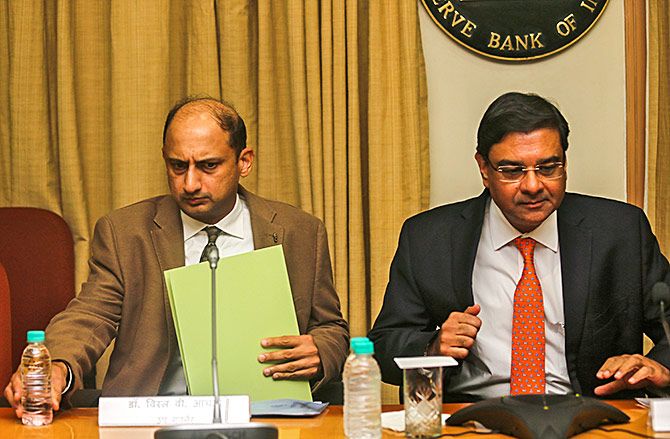 | « Back to article | Print this article |
'It is likely the government may opt for an IAS officer.'
'For the government, an IAS officer will be more easy to deal with,' notes A K Bhattacharya.

In a statement of less than 90 words, Urjit Ravindra Patel on Monday, December 10, announced his resignation as governor of the Reserve Bank of India.
Dr Patel was the 24th governor of the RBI and cited personal reasons for his decision to step down with immediate effect, cutting short his three-year term by nine months.
The ball is now in the government's court on whether it asks Dr Patel to continue as RBI governor till it finds his successor or accepts the resignation immediately and selects one of the deputy governors as an acting governor till such time a full-time governor is appointed.
The timing of the announcement has left everyone guessing what might have transpired in between Dr Patel's unofficial meeting with the prime minister last month and now.
His meeting with the PM was held in the background of strained ties between the RBI and the government over a wide range of issues pertaining to regulation and governance.
The contentious issues included the amount of capital that the central bank should transfer to the government, the relaxation of norms for maintaining minimum capital requirements for public sector banks, and regulatory forbearance with regard to recognition of bad loans.
The unofficial meeting with the PM followed two stormy meetings of the RBI board and an address delivered by RBI Deputy Governor Viral Acharya who warned that governments that undermine the autonomy of the central bank incur the wrath of the markets.
It had appeared after the PM-Patel meeting that the RBI and the government had called a truce. Dr Patel's resignation on Monday has proved all such conjectures wrong.
Dr Patel's predecessor, Raghuram G Rajan also had announced his resignation before the end of his tenure, but had not quit with immediate effect. He had issued a statement on June 18, 2016, saying that he had decided not to continue in the job after the completion of his three-year tenure in September 2016.
That gave the government time to identify Dr Rajan's successor. Dr Patel's abrupt resignation has created an avoidable uncertainty.
Dr Patel is the third high-profile economist who quit the Modi government before completing his tenure. Dr Arvind Panagariya had earlier quit NITI Aayog as its vice-chairman before the end of his tenure and then Dr Arvind Subramanian too left the government as chief economic advisor a few months before his extended tenure was to end.
While the exits of Dr Panagariya and Dr Subramanian did not follow any controversy, Dr Patel has left amidst differences of opinion between the RBI and the government.
Dr Patel's resignation is disturbing also because it can have a negative impact on the top RBI team, particularly Deputy Governor Viral Acharya who was Dr Patel's choice and who had made the speech warning the government of adverse consequences if the central bank's autonomy were to be undermined.
Who will succeed Dr Patel as the RBI governor?
It is likely that the government may opt for an Indian Administrative Service officer to see through the next year by when the general election would be completed. Many governments in the past have chosen an IAS officer to lead the RBI in such situations.
The case for an IAS officer to lead the RBI may now have become even stronger as the government would not like to wage another battle with the next RBI governor over the central bank's autonomy.
For the government, an IAS officer will be more easy to deal with.
Dr Patel's decision to resign over the question of preserving the RBI's autonomy may provide a new dimension to his tenure as a central bank governor.
He would always be remembered as the RBI governor on whose watch demonetisation took place, leading to major economic disruption and a slowdown.
With his decision to quit on the question of the RBI's autonomy, Dr Patel may have redeemed himself and will be seen also as one who gave up his job on a matter of principle.
But there is little doubt that the manner of his exit will have serious implications for the institutional strength that the RBI had acquired over the years and the regulatory environment in the financial sector.
Airing of differences between the government and the RBI, leading to the governor's sudden resignation, does not bode well for either the government or the central bank.